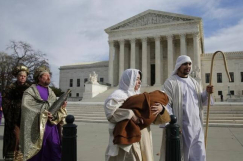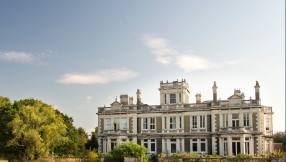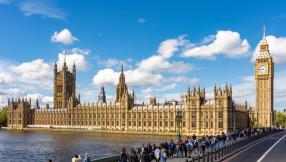Christmas starts with Christ – or does it?
Lots of people today argue that Christmas is just a pagan mid-winter festival that was taken over by the Church and turned into a celebration of the birth of Christ. In America, many people even say "Happy Holidays" instead of "Merry Christmas" because they're worried about offending people who aren't Christians.
This leads to very sharp reactions from Christians who want to say that the "real meaning of Christmas" is a religious one, and accuse secularists of trying to rewrite history.
So who's right? Well both, actually.
1. It's absolutely true that the Christmas festival has pagan origins. One of its roots was the Roman holiday of Saturnalia, a festival of light which was held between December 17-25. Gifts were given and normal social rules were relaxed, with the barriers between slaves and their owners temporarily broken down.
Roman followers of the sun god Mithras (from whom we get Sundays) believed he was born on December 25 and celebrated accordingly.
It's also traced back to the Norse feast of Yule, on the winter solstice, when large logs were set on fire and people would feast until they burned out days later. In Germany, the god Odin was honoured.
2. As Christianity was spreading and pagan religions were dying out (or being deliberately suppressed), it made sense for the Christian authorities to work with the grain of the old faiths so that Christianity could be made more acceptable. So "Christianising" an existing feast was easier than stamping it out and trying to start a new one.
3. No one knows the date on which Jesus was born, but the first recorded date of Christmas being celebrated on December 25 was in 336AD, during the time of the Roman Emperor Constantine. A few years later, Pope Julius I declared that as the official birthday of Jesus.
4. Because of its origins and because people like to let their hair down, Christmas has always been a time of merrymaking. In England after the Civil War, Parliament tried to ban Christmas because they thought it had gone too far, sending inspectors in to people's homes to find out whether they were cooking Christmas dinner. It didn't last.
5. It's quite wrong for secularists to say that Christmas isn't a Christian festival. It has been for nearly 1700 years, and arguing that it is "really" something else just doesn't hold water.
6. It's also wrong for Christians to say that it is "really" a Christian festival and that anyone who denies this is an enemy of the gospel and a historical ignoramus. It's always been other things too.
7. But Christians do have a right to ask what Christmas means if it isn't about Christ. Pagans believed in something. Take religion out of Christmas and all that you're left with is food, shopping and a nod to peace and goodwill. But when you detach the "peace on earth" from its roots in what the angel said to the shepherds (Luke 2:14), all that's left is over-indulgence and indigestion.
Perhaps the best way for Christians to approach it is to remember that Christ is a gift, and so is Christmas. I think we should worry when Christmas seems to be downgraded, but only because people are missing something precious. Gifts are to be offered humbly, not fought over and imposed.
Happy Christmas.
Follow @RevMarkWoods on Twitter.

















